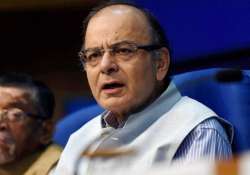Three-day GST Council meet begins today; tax rate, compensation formula high on agenda
The crucial three-day meeting of the Goods and Services Tax (GST) Council is slated to begin from today.

The crucial three-day meeting of the Goods and Services Tax (GST) Council is slated to begin from today.
The meeting is significant as the Ministry of Finance has set November 22 as the deadline for building consensus on all the issues including decision on the tax rate and compensation formula.
The government aims to implement Goods and Services Tax from April 1, 2017.
At its previous meeting last month, the Council, which has all state Finance Ministers as members, had finalised area-based exemptions and how 11 states, mostly in the North-East and hilly regions, will be treated under the new tax regime.
Today’s meeting will also deliberate on the vexed issue of the Centre retaining power to assess 11 lakh service tax filers under the new dispensation.
While a decision to this effect was taken at the first meeting of the GST Council, at least two states dithered on approving the minutes of the meeting, saying they are not in favour of losing power of assessment of these assessees.
The finance ministry will try and reach a consensus on key issues so that the subsequent central GST (CGST) and integrated GST (IGST) legislations can be introduced in the month-long Winter Session of Parliament beginning November 16.
Last year, a panel headed by Chief Economic Advisor Arvind Subramanian had suggested 17-18 per cent as the standard rate for bulk of goods and services while recommending 12 percent for low rate goods and 40 percent for demerit ones like luxury car, aerated beverages, pan masala and tobacco. For precious metals, it recommended a range of 2-6 percent.
Finance Minister Arun Jaitley had last week said tax on environment-unfriendly products will be "distinct" from others in the GST framework.
As for the formula for the Centre compensating loss of revenue to states, 3-4 alternatives were discussed at the first meet, but a decision could not be reached.
“The indirect tax regime that we are planning, the rate of taxation on such products which are going to be environment unfriendly would be distinct from the normal rate of taxation. This is one of the proposals being discussed," Jaitley had said.
As per the proposals, a state can be compensated if the revenue under GST falls short of the average tax earnings in the best three years out of the past five years.
Second, of the five years, two outliers are left out and an average is taken. If the revenue under GST is short of this, then states get compensated.
Third, a base year can be fixed and a particular growth rate decided for all states. If the revenue falls short of that, then the state gets compensated. The base year would be 2015-16.
Another suggestion was on a fixed rate of revenue growth and give compensation, he said.
So far, as many as six issues have been settled by the GST Council, including finalisation of rules for registration, rules for payments, returns, refunds and invoices.
In the first meeting, the Centre and states had reached an agreement on keeping traders with annual revenue of up to Rs 20 lakh out of the new national sales tax ambit that will subsume all cesses.
It also resolved issues over dual control over small traders, and decided that states will have exclusive control over all dealers up to a revenue threshold of Rs 1.5 crore in a year. A mechanism will be worked out for traders above Rs 1.5 crore to ensure a dealer is regulated either by the central government or the state and not both.
With PTI Inputs